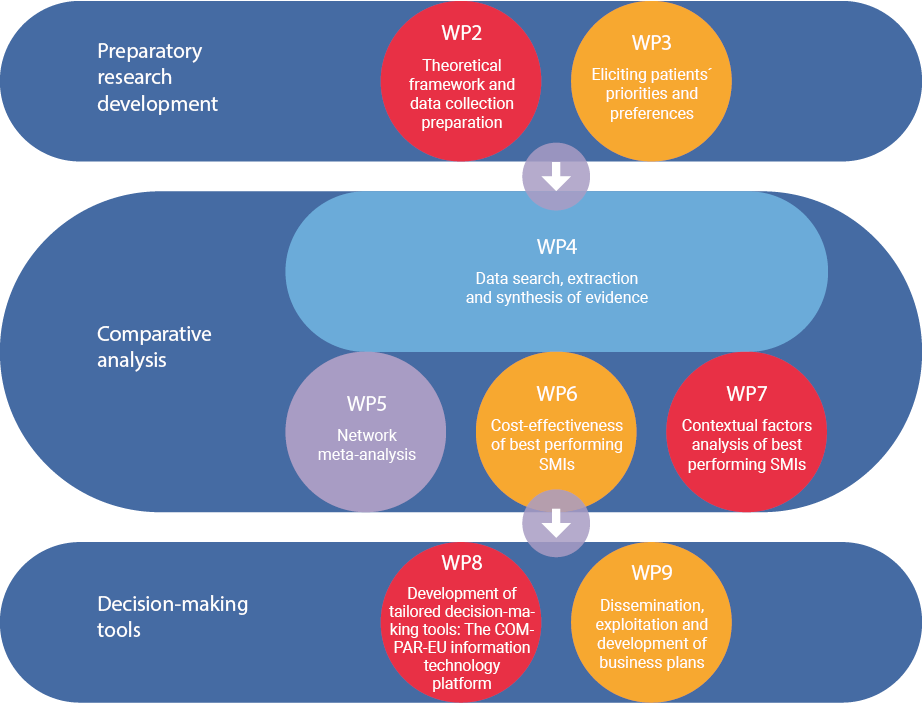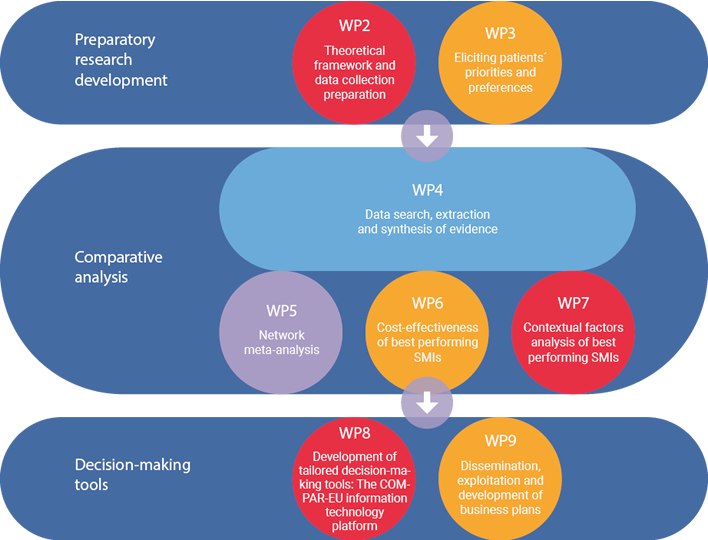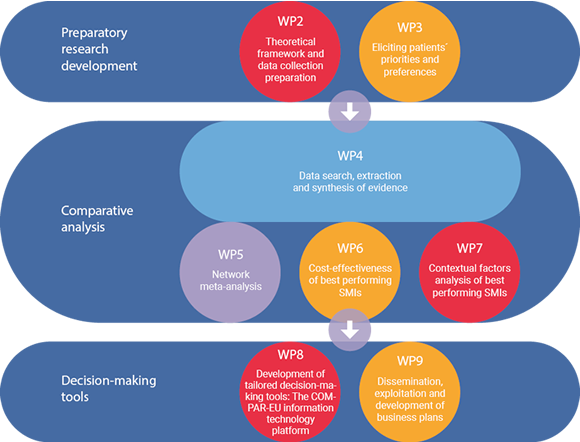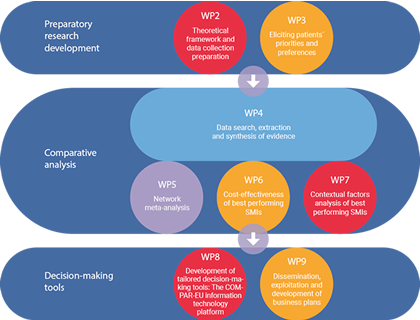What is the COMPAR-EU project?
COMPAR-EU is a multimethod, inter-disciplinary project that will contribute to bridging the gap between current knowledge and practice of self-management interventions. COMPAR-EU aims to identify, compare, and rank the most effective and cost-effective self-management interventions (SMIs) for adults in Europe living with one of the four high-priority chronic conditions: type 2 diabetes, obesity, chronic obstructive pulmonary
disease, and heart failure. The project will provide support for policymakers, guideline developers and professionals to make informed decisions on the adoption of the most suitable self-management interventions through an IT platform, featuring decision-making tools adapted to the needs of a wide range of end users (including researchers, patients, and industry).
COMPAR-EU: What is the project about?
COMPAR-EU platform to support decision-making on self-management interventions
Our project is coming to its completion at the end of 2022. We take this opportunity to thank you once again for your interest and contributions.
During the last semester of the project, the main focus was on dissemination efforts: the research conference which presented the project’s results and opportunities for sustainability; the advocacy conference held with patients and policymakers to create awareness about self-management; and presentations about the platform on different occasions.
We hope the project results will reach our different audiences and offer new opportunities to improve self-management. We especially recommend that you check out the spin-off that emerged from COMPAR-EU: Self-management Europe (SME). SME will allow us to keep the platform updated or generate new resources helpful for various target groups.
We look forward to continuing our contact with you through this initiative. In this context, instead of saying goodbye, we’ll see you soon!
Blog

Gender perspective and self-management interventions on chronic diseases: diabetes, obesity, COPD and heart failure
The success of SMIs can be measured by concepts such as self-efficacy, knowledge and quality of life. The barriers to achieving a healthier lifestyle can differ for men and women. Therefore, SMIs should be personalized to address women’s unique needs, and additional emotional and psychosocial support should be readily accessible.
Scientific Articles
Effectiveness of eHealth Self-management Interventions in Patients With Heart Failure: Systematic Review and Meta-analysis
Heart failure (HF) is a common clinical syndrome associated with substantial morbidity, a heavy economic burden, and high risk of readmission. eHealth self-management interventions may be an effective way to improve HF clinical outcomes. Objective: The aim of this study was to systematically review the evidence for the effectiveness of eHealth self-management in patients with HF.
News
COMPAR-EU Final Newsletter
Dear readers, it is a pleasure for our consortium to publish this last COMPAR-EU newsletter. Our project is coming to [...]
New COMPAR-EU leaflet on recommendations for the future, the platform and Self-Management Europe
The COMPAR-EU project team recently the second leaflet containing new updates on the work on the project and an outlook [...]
The COMPAR-EU platform launched
Evidence for existing self-management interventions (SMIs) is increasing exponentially, as is the need for strategies and tools to facilitate their [...]
Events
COMPAR-EU Final Research Conference
During the last 5 years, COMPAR-EU has identified, compared, and [...]
COMPAR-EU Final Conference Advocacy Event
The European Patiens Forum will host the COMPAR-EU Final Conference [...]
An EU-Funded Project Supporting Self-Management
Find out more about the project in this video.
Click here for Spanish subtitles!
Key elements & benefits of patient self-management
Thanks to all interviewee who participated in this video that we have recorded at the European Patients´ Forum Congress 2019.
Work Packages
COMPAR-EU is based on a multimethod, interdisciplinary approach. The project exists of three main phases and is divided into ten work packages (WP), integrating partners from Belgium, Germany, Greece, the Netherlands and Spain.





*WP1 and WP10 are not presented in the figure as they draw on the entire project. The objective of WP1 is to ensure compliance with the ethics requirements. WP10 addresses the overall strategic project coordination and management.




